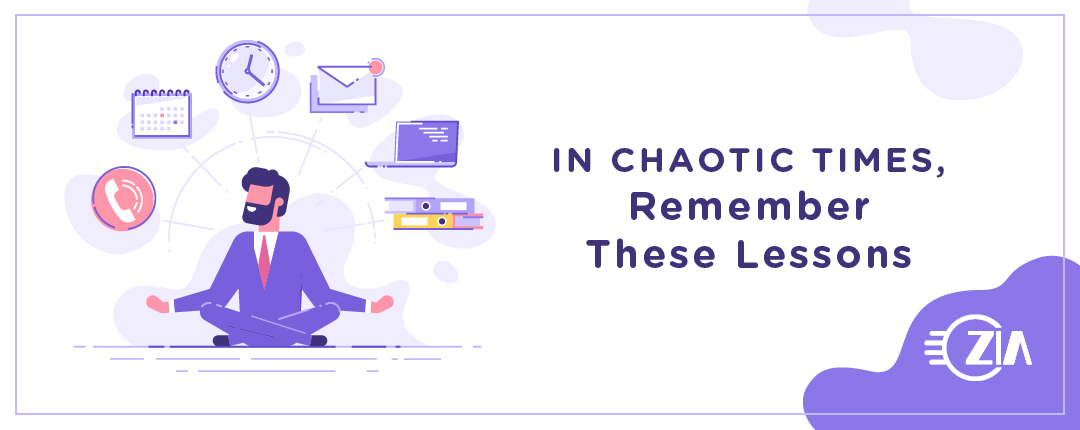As you know, the day-to-day lives of individuals, families, and businesses around the world are being impacted by the pandemic. For me personally, this isn’t the first hardship that I’ve encountered as a business owner. However, it has certainly been the most significant and strange. In the process, I’ve learned a lot and been reminded of these ten lessons that I would like to share with you.
1. We have to learn our way out of this.
There is no denying that the world has changed. To adjust to these changes, we have to become the Chief Learning Officer of our own life. This applies to how we work and how we think about problems. This means it’s our personal responsibility to learn from experts and gather their teachings on coping with hardships. For me, the speakers presented through Vistage have given me information and resources that have had a dramatic impact on our business. People have Zoom and Teams fatigue now, but it’s still an efficient way to soak up knowledge. Here are a few great books I recommend for anyone who wants to explore how to think about their business differently.
- “Intentional Engagement: Empowered Path to Culture Change” by Richard Leaton
- “Beat the Crisis: 33 Quick Solutions for Your Company” by Hermann Simon
- “Principles: Life and Work” by Ray Dalio
- “Green Swans: The Coming Boom in Regenerative Capitalism” by John Elkington
2. Focus on creating value and lasting relationships with your employees, partners, and customers.
Having our lead funnel dry up has challenged our marketing team. However, we’ve generated an incredible amount of valuable content in the past four months. We have published an Excellence at Zia blog series, hosted several Professor Pat sessions for Ephesoft customers, created blogs from our engineering teams, and offered our customers and partners our expertise on working from home, securing your home office, and editing resumes for people in our community who were furloughed or laid off. While this has yet to drive a lot of new customers, it has allowed us to communicate our values loud and clear.
Switching from face-to-face activities to a complete schedule of virtual events has been a challenge, as communication mostly flows in one direction. We offer our messages to the audience, but it’s often difficult or uncomfortable for the recipient to respond in a virtual environment, thus making conversations one-sided. As we’re not having as many vocal discussions, we’ve developed a new lead scoring model that tracks prospects’ digital body language—or their engagement with our website, social media, webinars, town hall events, email campaigns, and more—to pinpoint the most attentive leads worth putting into our inside sales funnel. Instead of calling all of the “suspects,” our inside sales team can pay attention to actual prospects who have shown interest in our solutions.
3. Being calm takes work.
“Calm is contagious.” —Rorke Denver, American actor, author, and former United States Navy SEALs commander
Recently, I wrote an article based on Rorke Denver writings about his time as a Navy SEALs commander. “Calm is contagious” is one of his most impactful messages. I review that article when I find myself spending too much time reading or watching news about the pandemic. I’ve trained as an athlete and adventured in the mountains for most of my life. Being calm when you are risking your life is the difference between coming home or not. The tips and tricks I’ve learned from those situations have been useful to running Zia during the past several months. Rather than getting wrapped up in everything that is going on around us, I focus on what I can do today, reach out to people in my network, and find someone to serve.
4. Simplifying your life can have advantages.
Three major outcomes have resulted from the pandemic simplifying my life.
- My relationship with my wife is better than ever.
- I’m more productive and creative at work.
- My ability to focus increased now that I’m not constantly on a plane.
This spring and summer, I biked almost daily, skied in the backcountry, began gardening again, and canned my own food. I remembered how much I enjoy being outside and allowing myself time to think. I’m not sure what it would have taken to get me to slow down, but this has been a blessing. As a bonus, I have had time to devour business books and work on how Zia does business moving into the future.
5. Daily routines create long-term change.
“Don’t waste your time looking back. You’re not going that way.” —Ragnar Lothbrok, legendary Viking hero
Several great leaders talk about focusing on daily agendas, routines and thoughts. Your routine may involve working on your most important tasks (MITs) first, habit stacking from James Clear’s “Atomic Habits,” building in rewards like “The Power of Habit” by Charles Duhigg describes, or following “The 7 Habits of Highly Successful People” by Stephen Covey. It doesn’t matter; just use one! You will be more productive and at ease when working. Consistently focusing on small changes leads to great changes over time.
6. Over-communicate the good, the bad, and the ugly.
I’m dedicated to meeting with my entire staff regularly. Since mid-March, we have met 13 times as a company to talk about the state of the business, share how we are helping each other and our community, and discuss what the future holds. One thing I’ve taken from this time is, “As I go, so the team goes.” If I am enthusiastic and positive, the team picks up on it. If my mood and energy are poor, they sense that too. The impact of negativity can be lasting if not corrected. I’ve created several programs to break that cycle.
- The Perfect Day Program: This program is about finding out what constitutes a perfect day for each of our employees, then sending them small gifts that symbolize that day.
- Nominating Zia Heroes: This involves publicly recognizing specific actions that a team member has taken to support an employee, partner, or customer. The team celebrates the little things and expresses gratitude for one another. The impact of this is that people feel noticed, appreciated, and known on a deeper level.
7. Uncertain times test culture and values.
It’s one thing to say you use your culture and values to make decisions and drive change. It’s quite another to hold yourself accountable to them and publicly share with your team how you are relying on them. For example, many of the CEOs that I know cut payroll expenses immediately in anticipation of hard times ahead. It was tempting to do the same. Instead, we cut every possible expense, submitted our CARES Act loan, and focused on our existing work with the customers and deals we had in our sales pipeline.
We made it clear that we were in this together. Leadership was explicit about the importance of over-communicating, over-delivering, and over-collaborating so that everyone on the team could win. We called to check in on our customers and partners. It would be inconsistent to tell the team that “calm is contagious,” then cut pay without evidence that it is necessary. Instead, we’re managing the business cautiously and planning for hard times. We adjust and communicate our plans to the entire team as circumstances change. By focusing on getting the right things done, we can maintain care and compassion for our Zia Family.
8. Have fanatical discipline.
“We need to exert self-control in a world out of control. The more out of control the conditions are, the more disciplined you need to be.”
This quote from business management researcher Jim Collins perfectly captures the notion of fanatical discipline. In my personal life, this applies to my fitness, mental health, diet, relationships, and conversations with friends and family. In business, this reminds me to focus on Zia’s mission, vision, culture, and cash.
9. Be empathetic and humble.
“It is better to be interested rather than be interesting.” —Dale Carnegie, “How to Win Friends and Influence People” author
Be empathetic to people you interact with. In times of crisis, people will often respond to stressful situations with their lowest level of training. This may mean someone overreacts to a situation or responds more negatively than they normally would. Don’t focus on that, focus on the person, look past their response, validate them, and help them be calm. You will get a better response and create a stronger relationship out of your interaction. Humility is another great value to remember. Stay humble.
10. What we stop doing is as important as what we start doing.
“Stop doing stupid stuff.” —Greg Brenneman, American businessman
Slowing down has forced us to eliminate busy work and start focusing on what will make us better in the future. I’ve seen the benefits of focusing on the most important things daily, so that we will be in a position to thrive when we get past the survival stage of this pandemic. In the book “Right Away & All at Once,” author Greg Brenneman recommends the first thing that a business, division, or team does is to “Stop Doing Stupid Stuff.” Our sales team recently completed this exercise with a goal of increasing their selling time up to 25% by removing spurious tasks. They determined that constantly checking email, scheduling meetings without clear objectives, and recurring “cadence calls” are time sinks that can be immediately stopped to free up uninterrupted time blocks.
Enjoyed this post? Read more from our blog, or contact us for a discovery call today.

